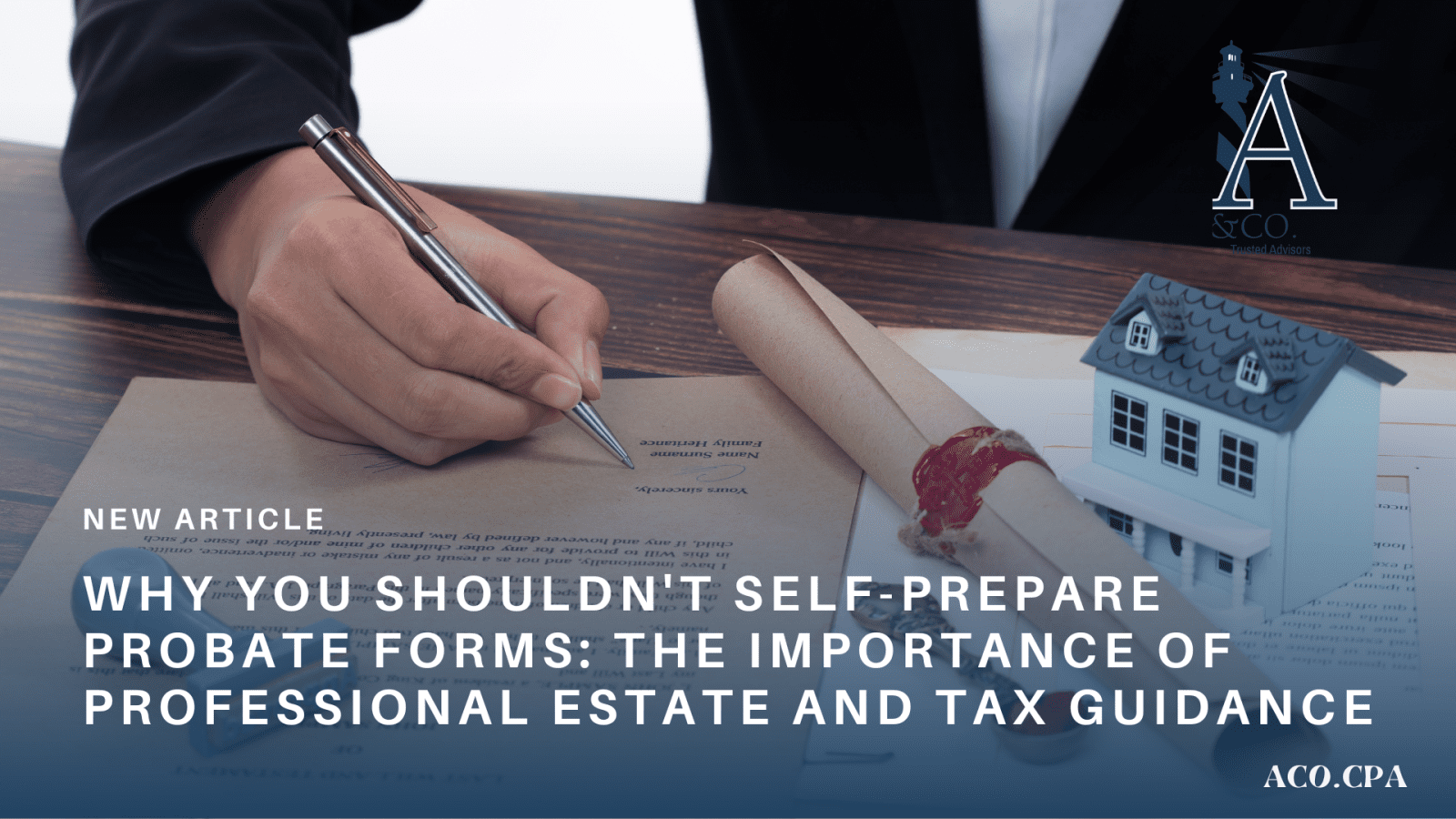When someone passes away, the estate they leave behind must be administered through a legal process known as probate. While probate may seem straightforward, it involves a range of complex legal and tax-related issues that can significantly impact the value of the estate and the beneficiaries. One common mistake that many people make is attempting to self-prepare probate forms. In doing so, they risk overlooking key tax-saving opportunities, such as basis step-ups and allowable deductions, and fail to structure the estate for optimal tax planning. It is crucial to understand why working with an attorney and accountant is essential in navigating this process, particularly when dealing with large estates and high-income tax implications.
The Risk of Missing Basis Step-Ups and Deductions
One of the most important aspects of probate is determining the value of the decedent’s assets. When assets are passed to heirs or beneficiaries, the “basis” of those assets becomes a critical factor in calculating potential capital gains taxes upon their future sale. In most cases, the assets’ basis is stepped up to the fair market value on the date of the decedent’s death, a provision that can save heirs from significant capital gains taxes when they eventually sell inherited property.
However, if probate forms are not prepared accurately, there is a risk that the estate could fail to receive the proper basis step-up for certain assets. For example, in the case of real estate or stocks, failing to appraise these assets at their date-of-death value could lead to a higher tax burden on the beneficiaries when they sell the property. This issue is compounded if deductions that reduce the estate’s taxable value are missed.
An experienced estate attorney or tax professional can ensure that the probate process accounts for all eligible deductions and that the basis of each asset is correctly established. Whether it’s real estate, stocks, or personal property, these professionals can help ensure that your estate’s value is minimized for tax purposes, while still adhering to legal requirements.
The Importance of Having an Attorney and Accountant
Self-preparing probate forms not only risks missing tax-saving opportunities but can also lead to legal issues. Probate law is complicated, and every state has different rules and regulations governing the process. While some probate cases are relatively simple, larger estates, especially those involving complex assets or disputes among heirs, require expertise.
An estate attorney provides invaluable assistance by guiding you through the probate process, ensuring that all legal requirements are met and that the wishes of the decedent are respected. From drafting the will and filing the necessary forms to representing the estate in court if needed, an attorney can prevent errors that may delay the probate process or even invalidate a will.
Equally important is the role of a certified public accountant (CPA) or tax professional. Estates with substantial assets or income can incur significant income taxes, particularly if the estate generates income during the probate process. An accountant can help with crucial decisions, such as electing the fiscal year for the estate, which can have important tax consequences. In some cases, the estate may be eligible to elect a fiscal year, allowing it to defer income taxes, a move that could reduce the overall tax burden on the estate.
Electing Fiscal Years for Estates
An estate can be taxed as a calendar-year taxpayer or, in some cases, elect to use a fiscal year. This decision, although seemingly minor, can have significant tax advantages for larger estates. The choice of fiscal year allows the estate to shift income to a year that minimizes taxes or to extend income recognition, which can be critical when managing the estate’s liabilities.
By electing the fiscal year carefully, the estate’s executor can spread income over a more favorable period, which may reduce the total income taxes owed. This strategy requires a nuanced understanding of tax laws and regulations—something a knowledgeable tax professional can provide.
Planning Distribution Strategies to Minimize Taxes
Another essential aspect of estate administration involves planning the distribution of assets. High-net-worth estates often involve complex strategies for minimizing taxes, especially in the context of the estate’s income taxes and inheritance taxes. Without careful planning, the estate may face excessive income taxes, and heirs may be left with a significantly reduced inheritance.
A tax professional can help create a distribution plan that minimizes income taxes at both the estate level and the beneficiary level. For example, the way assets are distributed between beneficiaries may have tax implications that affect the overall tax burden. Understanding the tax treatment of different types of income, such as dividends, interest, or capital gains, can help guide the timing and structure of distributions.
Moreover, structuring the estate in a way that maximizes allowable deductions is crucial. Deductions related to debts, administration expenses, and charitable contributions can reduce the taxable estate, thus lowering the tax burden on both the estate and the beneficiaries.
While self-preparing probate forms may seem like an appealing way to cut costs, the complexities involved in estate administration make it a risky choice. Missing out on tax-saving strategies such as basis step-ups, overlooking allowable deductions, and failing to structure the estate optimally can result in higher taxes for both the estate and its beneficiaries.
Hiring an experienced estate attorney and a knowledgeable accountant is essential to navigating the probate process effectively. These professionals ensure that the decedent’s wishes are honored, the estate is properly valued, and the most advantageous tax strategies are employed, from electing the fiscal year to planning asset distributions. The estate planning process is too important and too intricate to leave to chance or self-preparation. With the help of experts, you can ensure that the estate is managed in the most tax-efficient way possible, providing your heirs with the maximum benefit.



